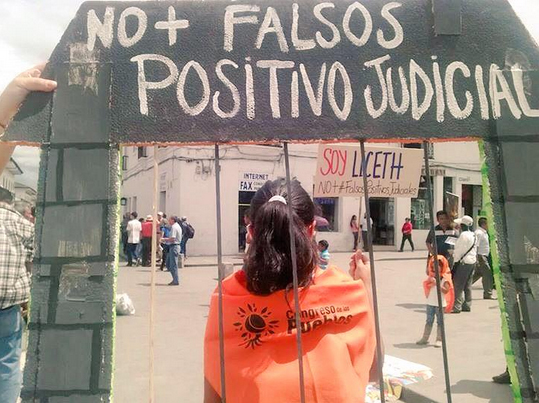
On the morning of July 8, the district attorney of Colombia, in coordination with the National Police, rounded up and arrested 16 people for their alleged connection to a bombing in the capital city of Bogotá a few days earlier. Today, those arrested sit in their cells awaiting indictment. The question being asked by the country’s activists, progressive media and a growing base of skeptics outside of the cellblock is whether they’ve done anything wrong.
Despite a marked lack of evidence, Colombian President Manuel Santos has pinned the attack on the National Liberation Army – the country’s second largest terrorist group next to the FARC. Following the raids, Santos’ Defense Ministry further claimed that the suspects were “acting in the name of the ELN,” the Spanish abbreviation of the rebel group.
But are those arrested the hardened guerrillas the government claims? Among the jailed are Jhon Fernando Acosta, a 19-year-old performing arts student active around issues of gender equality, and Heilar Lampara, a 25-year-old representative to the Superior University Council from the National Teacher’s University and an advocate for free higher education. Writer Sergio Esteban Segura Guiza, who has covered the country’s armed conflict and peace process as a correspondent for the independent news outlet Colombia Informa, had his journalistic archive seized at the time of his arrest. Women’s rights lawyer Paola Andrea Salgado Piedrahita, also arrested, could face as many as 30 years in prison if the case goes to trial.
Many are organizers within Colombia’s student movement through the National Student Roundtable, or MANU, and seven are affiliated with Congreso de los Pueblos, a social and political movement fighting, amongst other issues, against displacement by the country’s extractive industry. Two are contractors with the city government. While Fernando Acosta is the youngest of those arrested, none are over the age of 34.
Notably, no members of the ELN have claimed responsibility for either the attack or those arrested. In an interview conducted via Twitter by VICE News, an ELN representative working with their broadcasting outlet, Radio Patria Libre, said, “Absolutely all our structures and fronts do not know any of those captured and not one of them is an ELN militant.”
Although the public explanation for the arrests was the bombing, Adriana Leaño Siado, a lawyer on the case, said that the bulk of the evidence presented by the district attorney in early indictment hearings thus far has been related to a riot and demonstration at the National University in late May. In the wake of the attack, she said, this “is a case of a legal false positive, to show rapid results to the terrified public and citizens.”
Given that those arrested share a background in activism, civil society groups are tying the raids into a large pattern of government repression. According to a press release from Congreso de los Pueblos, 8,600 people were arrested between 2009 and 2012 in Colombia for ties to terrorism; more than 75 percent of those have been declared innocent. The Foundation for the Freedom of the Press also reported that, in 2015 alone, 85 journalists have been “victims of persecution and human rights violations.” According to Amnesty International, there has been “a significant increase in death threats against human rights defenders and social activists” in Colombia.
Congreso de los Pueblos and others are now mounting a campaign to demand – at the very least – that those accused receive a fair trial and due process as the case proceeds.Colombia Informa is enlisting journalists from around the world to call attention to what editors say could set a “frightening precedent for the freedom of press in Colombia.” While most signatories are culled from Venezuela and Argentina, writers from Belgium and France have also joined in the call. The hashtag #LibertadSonInocentes has also emerged as a means to show international solidarity online. Camila Vallejo, the former student movement leader now serving in the Chile’s governing House of Deputies, voiced her support for the cause on Twitter earlier this week.
According to Siado, the district attorney’s initial presentation of evidence revealed that all of the detained have had their phones tapped by authorities in the last several months. “The results of the monitoring and the surveillance,” she noted, “show basically the same: departures and arrivals of the young people from their houses, to the university, to a meeting, to a paper supplies store, to a mall.” Those arrested had computers, phones, hard drives, cameras and USB drives seized as evidence, yet in none of the raids did police find weapons or evidence that students had been building explosives. “Amongst the seized material the only thing allusive to the ELN and ‘other terrorist groups’ (according to the DA) were some flyers and pamphlets and stickers, ‘allusive to the revolution,'” Siado added. Authorities even confiscated supposedly incriminating items of clothing carrying revolutionary cache: berets, overalls, balaclavas and cargo pants.
“The presumption of innocence,” she said, “is a constitutional right. They should not be in prison until the investigation has culminated… when they are judged and put on trial.” Regardless of how this case proceeds, organizers in Colombia are making sure that news of the activists’ fate extends well beyond their own borders.
Join us in defending the truth before it’s too late
The future of independent journalism is uncertain, and the consequences of losing it are too grave to ignore. To ensure Truthout remains safe, strong, and free, we need to raise $27,000 in the next 24 hours. Every dollar raised goes directly toward the costs of producing news you can trust.
Please give what you can — because by supporting us with a tax-deductible donation, you’re not just preserving a source of news, you’re helping to safeguard what’s left of our democracy.